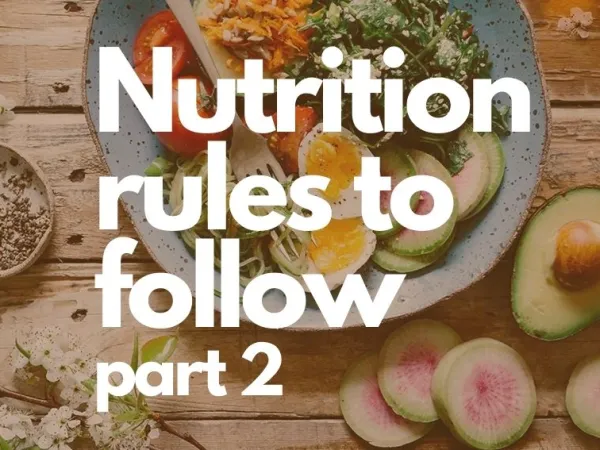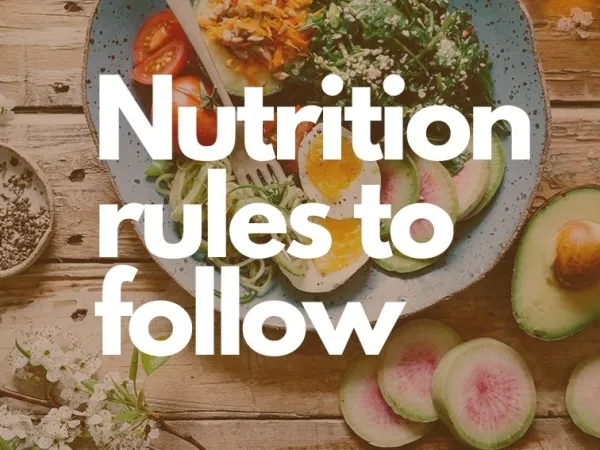Welcome back to part 2 of this blog series, debunking nutrition myths. Last week I talked about how it is easy to believe everything that you’re told because it takes the blame away from ourselves. On top of this, it takes away the thinking we have to do for ourselves. We have to start looking at what our own bodies need and how they respond to whatever you put in it. I could tell you that going keto (eating high fat) is the greatest thing for me and that you should try it too. But what if your body doesn’t respond to it at all? Are you just going to stick with it even though your body feels terrible because of it? I really hope not. Let’s take another example. How about telling you that 16 hours of fasting every single day is the greatest thing for you, but you have a busy work schedule and family that you have dinner with every single night. Are you going to force yourself to do it and feel like a failure because you will likely not meet those standards every single day? Again, I hope not.
We have to start thinking for ourselves, rather than taking someone else’s word for it. It’s the same with this blog. If you don’t agree with what I am saying about these topics, that is fine. But give a clear reason why that is other than because someone else said so or because you’re stuck in your own beliefs. If you can’t tell me the reasoning behind what you’re eating each day, you’re simply doing yourself a disservice or you’re not questioning what other people tell you enough.
Long story short, there are too many nutrition myths out there and let me tell you why they’re not true.
Eating vegan/veggie is healthier than eating meat
What metrics are we using to define this? Are we using weight loss? Are we using your energy levels throughout the day? Are we using the way someone looks?
Let me give you my definition of what healthy eating is. Nutrition that supports your lifestyle, health and activity levels without supporting body fat, while making your body physically and mentally feel good on a daily basis.
Whether you do that by eating vegan, veggie or meat, I don’t care because that is your choice. But where is this notion coming from that veganism is healthier than eating meat? The last time I checked most meat replacement products (like tofu, tempeh and seitan) are produced in a factory. My meat is coming from a farm. Processed foods create inflammatory responses inside the body. This is your body being affected by bacteria and toxins that it now has to fight and get rid of. On top of this, food that is put together in a factory will include ingredients that don’t belong in your food. Have you ever checked out a label and found an ingredient you couldn’t pronounce? That doesn’t belong there.
To make a case for why eating meat is healthier in relation to eating vegan. Meat generally doesn’t come with many other nutrients than protein. If you buy a piece of beef, it may have some fat in there but you can choose different cuts and types if you want. With vegan ”protein sources” you will usually get a 1:1 ratio of protein to carbohydrates (if not more).
Now don’t get me wrong, I am not telling you that eating ”normal” is what you should be doing because there is plenty wrong with the food industry in general. In today’s world neither option sounds perfect, but if you source your food from the right places, there’s no argument that supports this thought of veganism being healthier than eating meat.
Low fat or fat free foods are healthier
In most cases low fat or fat free just means more carbohydrates and sugar to make up for the lack of fat in your product. Is that healthy? I guess it depends on what standard you’re measuring to. If we use my definition that I talked about earlier, there’s nothing wrong with taking in fat.
If you really feel like you should be avoiding fat in your products, there’s probably something wrong within your nutrition overall. You can’t just blame one product for what your overall nutrition looks like. If you feel the need to eat fat free products, start thinking about toning down on the fattier foods throughout the entire day instead.
On top of this, if your product reads fat-free or low-fat, it clearly means that the product has been altered/ is processed. We have talked about this earlier, processed foods create inflammatory responses inside our body, that we have to fight now.
I really hope this clears up some of the clutter that is the nutrition and fitness space. If you have any questions, feel free to drop them down below. Be on the lookout for part 3 next week
6 nutrition rules to follow, part 2
Welcome back to part 2 of this series, nutrition rules to follow. Really what this blog should be called is nutrition rules that you COULD follow. There’s already enough people out there that will tell you exactly what you should be doing and how to do it. Instead, I just want to give you the…
6 Nutrition rules to follow, part 1
Welcome back to another blog where we cover the wide topic of nutrition. The reason why I keep coming back to different topics related to nutrition is because the nutrition space is filled with false and misleading information. My goal is to simplify the message and give you honest information. I never want to tell…
5 Steps to getting stronger
Welcome back to this week’s blog where we cover a topic that I am super passionate about and that is getting stronger. Why am I so passionate about it? Because it has never come easy to me. Even since the start of my fitness journey I have always looked at other people in the gym…






Leave a comment